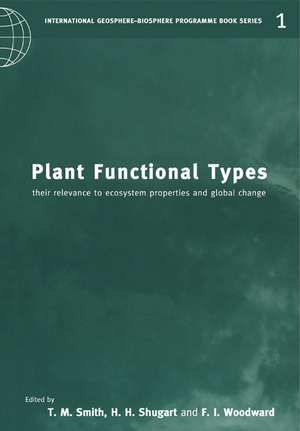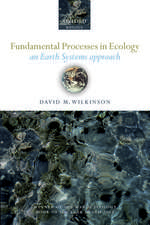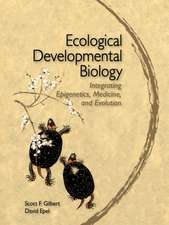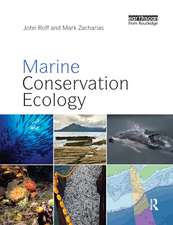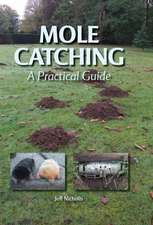Plant Functional Types: Their Relevance to Ecosystem Properties and Global Change: International Geosphere-Biosphere Programme Book Series, cartea 1
Editat de T. M. Smith, H. H. Shugart, F. I. Woodwarden Limba Engleză Paperback – 12 mai 1997
Preț: 384.01 lei
Nou
Puncte Express: 576
Preț estimativ în valută:
73.50€ • 76.44$ • 61.59£
73.50€ • 76.44$ • 61.59£
Carte tipărită la comandă
Livrare economică 14-28 martie
Preluare comenzi: 021 569.72.76
Specificații
ISBN-13: 9780521566438
ISBN-10: 0521566436
Pagini: 388
Dimensiuni: 173 x 247 x 21 mm
Greutate: 0.8 kg
Ediția:New.
Editura: Cambridge University Press
Colecția Cambridge University Press
Seria International Geosphere-Biosphere Programme Book Series
Locul publicării:Cambridge, United Kingdom
ISBN-10: 0521566436
Pagini: 388
Dimensiuni: 173 x 247 x 21 mm
Greutate: 0.8 kg
Ediția:New.
Editura: Cambridge University Press
Colecția Cambridge University Press
Seria International Geosphere-Biosphere Programme Book Series
Locul publicării:Cambridge, United Kingdom
Cuprins
List of contributors; Preface; Part I: 1. What are functional types and how should we seek them? H. Gitay and I. R. Noble; 2. Plant and ecosystem functional types H. H. Shugart; Part II: 3. Plant functional types: towards a definition by environmental constraints F. I. Woodward and C. K. Kelly; 4. Can we use plant functional types to describe and predict responses to environmental change? R. J. Hobbs; 5. Functional types in non-equilibrium ecosystems B. H. Walker; 6. Categorizing plant species into functional types M. Westoby and M. Leishman; 7. Functional types: testing the concept in Northern England J. P. Grime, J. G. Hodgson, R. Hunt, K. Thopson, G. A. F. Hendry, B. D. Campbell, A. Jalili, S. H. Hillier, S. Diaz and M. J. W. Burke; Part III: 8. Plant functional types and ecosystem change in arctic tundras G. R. Shaver, A. E. Giblin, K. J. Nadelhoffer and E. B. Rastetter; 9. Functional types for predicting changes in biodiversity: a case study in Cape Fynbos W. J. Bond; 10. Defining functional types for models of desertification J. F. Reynolds, R. A. Virginia and W. H. Schlesinger; 11. Plant functional types in temperate semi-arid regions O. E. Sala, W. K. Lauenroth and R. A. Golluscio; 12. Interactions between demographic and ecosystem processes in a semi-arid and an arid grassland: a challenge for plant functional types W. K. Lauenroth, D. P. Coffin, I. C. Burke and R. A. Virginia; 13. Plant functional types in African savannas and grasslands R. J. Scholes, G. Pickett, W. N. Ellery and A. C. Blackmore; Part IV: 14. Using plant functional types in a global vegetation model W. Cramer; 15. The use of plant functional type classifications to model the global land cover and simulate the interactions between the terrestrial biosphere and the atmosphere R. Leemans; Part V: 16. Examining the consequences of classifying species into functional types: a simulation model analysis T. M. Smith; 17. Ecosystem function of biodiversity: the basis of the viewpoint H. A. Mooney; 18. Defining plant functional types: the end view F. I. Woodward, T. M. Smith and H. H. Shugart; Index.
Recenzii
"...an excellent introduction to the concept and use of PFT's and a valuable overview of the state of plant ecology in the 1990's." David A. Wedin, Ecoscience
"The strengths of the book are the consistently good quality of the chapters, its continuity of themes and its variety of perspectives...it is excellent for anyone interested in tundra or particularly arid and semiarid ecosystems... I would highly recommend this book to anyone interested in functional plant ecology and vegetation response to global change." David Hooper, The Quarterly Review of Biology
"Rooted in game theory and treating plants as strategists and gamblers, Plant Functional Types, an undergraduate textbook, considers shape and form as functions of differential energy allocation during the lifetime of plants. The Achilles heel of each strategy is made poignant by looking at the effects of global climate change on species' survival and community composition. A fine example of how to integrate theoretical and applied biology." New Scientist
"...the depth and breadth of coverage are impressive....This book is an important addition to a growing library of knowledge related to global change." Thomas R. Crowe, Ecoscience
"The strengths of the book are the consistently good quality of the chapters, its continuity of themes and its variety of perspectives...it is excellent for anyone interested in tundra or particularly arid and semiarid ecosystems... I would highly recommend this book to anyone interested in functional plant ecology and vegetation response to global change." David Hooper, The Quarterly Review of Biology
"Rooted in game theory and treating plants as strategists and gamblers, Plant Functional Types, an undergraduate textbook, considers shape and form as functions of differential energy allocation during the lifetime of plants. The Achilles heel of each strategy is made poignant by looking at the effects of global climate change on species' survival and community composition. A fine example of how to integrate theoretical and applied biology." New Scientist
"...the depth and breadth of coverage are impressive....This book is an important addition to a growing library of knowledge related to global change." Thomas R. Crowe, Ecoscience
Descriere
This 1997 book describes techniques for defining plant functional types in global detail.
